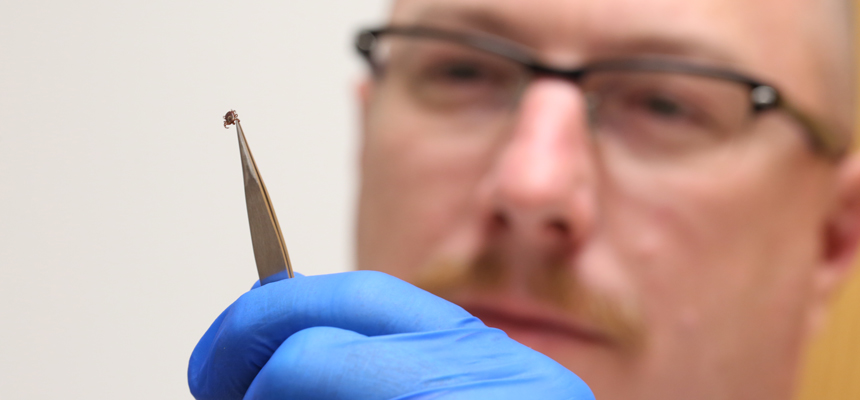Expect more diseases from ticks, mosquitoes and fleas
By Jan Jarvis

Get out the bug repellant and protective clothing. It could be a rough summer.
Rickettsiosis, murine typhus and relapsing fever are just a few of the insect-borne diseases that could make area residents sick this summer.
Already the Tick-Borne Disease Research Laboratory at UNT Health Science Center is braced for a busy season with a growing number of people submitting the parasites for testing.
“Last summer we saw a huge increase in the number of tick submissions,” said Michael Allen, PhD, the lab’s director. “By all of our measures, things are getting worse.”
The Centers for Disease Control and Prevention has said exactly that. Diseases from ticks, mosquitoes and fleas have more than tripled in recent years, according to a CDC report.
Since 2004 there have been at least nine new diseases discovered, among them the Heartland virus. The Heartland virus, first identified in 2009, has spread across the Midwest. There is no treatment and there has been at least one fatality.
The dangerous virus is not the only tick-borne disease people need to protect themselves from this summer.
“We have seen ticks in this area that can transmit a spotted fever group rickettsioses, along with a few confirmed cases in Tarrant County,” said Dr. Allen, Associate Professor of Microbiology, Immunology and Genetics.
Some of the other insect-borne diseases that are occurring in North Texas, including murine typhus, relapsing fever and Chagas disease, did not even make the CDC’s list, he said.
In recent years, Tarrant County has seen a dramatic increase in flea-borne murine typhus, a disease that is transmitted by the fleas of cats, opossums and rats. An outdoor cat can be exposed to the disease year-round and then bring home the fleas that can transmit it to its owner, Dr. Allen said.
“We’ve had more than 20 cases in Tarrant County alone,” he said. “The previous year we had six and the year before that three or four.”
Like most tick-borne diseases, it can cause flu-like symptoms such as fever, fatigue and aches.
“It’s not usually something you die from but it makes you feel terrible,” Dr. Allen said.
Mini outbreaks of tick-associated relapsing fever Borrelia have been found around Austin and in Central Texas. The disease is transmitted by soft ticks, which are most often encountered where wild animals have been bedding down, such as small caves or under houses.
Cases of Chagas disease, caused by a parasite transmitted by kissing bugs, have also increased statewide. The disease can be contracted from the bug but outdoor pets such as dogs are at greater risk.
For more than a decade, North Texas has been a hot spot for West Nile virus and this year is likely to see more cases. It has been six years since the biggest WNV epidemic in 2012 and the data show that an increase of human cases occurs in three-year intervals, said Joon Lee, PhD, Associate Professor of Biostatistics and Epidemiology.
“Recent research shows that low relative humidity prompts high mosquito activity and blood feeding, which may be associated with an increase of human cases in the summers with drought condition,” he said. “Warm weather and a long mosquito season are conducive to a high risk of exposures to mosquito-borne diseases in urban environments, regardless of amount of precipitation.”
Several years of mild winters are at least partially to blame for the increase in ticks.
“We rely on harsh winters to knock off some of the numbers.” Dr. Allen said.
An increasingly mobile society is also contributing to the problem. People traveling to heavily wooded areas in the East are more likely to be exposed to tick-borne Lyme disease. Those who travel outside the country are at risk for mosquito-borne diseases. It is important to communicate recent travel to your health care provider for proper diagnosis, Dr. Allen said.
To prevent getting a tick-borne disease, use products containing DEET, and wear light-colored clothing that makes it easy to spot a tick before it bites.
Anyone who suspects that a mosquito or tick is the cause of their symptoms should seek medical treatment. Many tick-borne diseases can be treated with antibiotics.
“Many mosquito-borne viruses have no treatment,” Dr. Allen said. “You just have to wait it out.”
Any Texas resident can submit tick samples to the Texas Department of State Health Services, which then sends them to UNTHSC for free testing. Only specimens from a Texas address are covered under an agreement with the state. This also includes ticks picked up by Texans traveling elsewhere.
Tick samples also can be submitted directly to Dr. Allen’s lab, and will be tested for a fee. Out-of-state residents and people interested in having ticks tested from their pets can submit samples – also for a fee.



![Uyen Sa Nguyen Scaled[58]](https://www.unthsc.edu/newsroom/wp-content/uploads/sites/16/Uyen-Sa-Nguyen-scaled58-145x175.jpg)

Social media